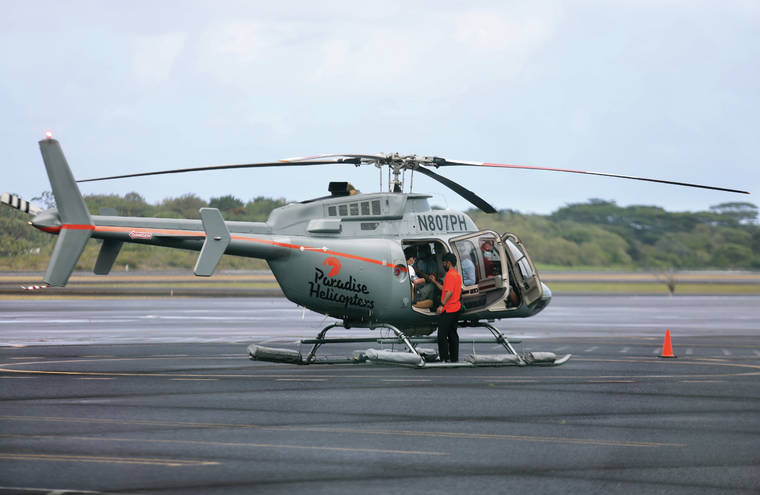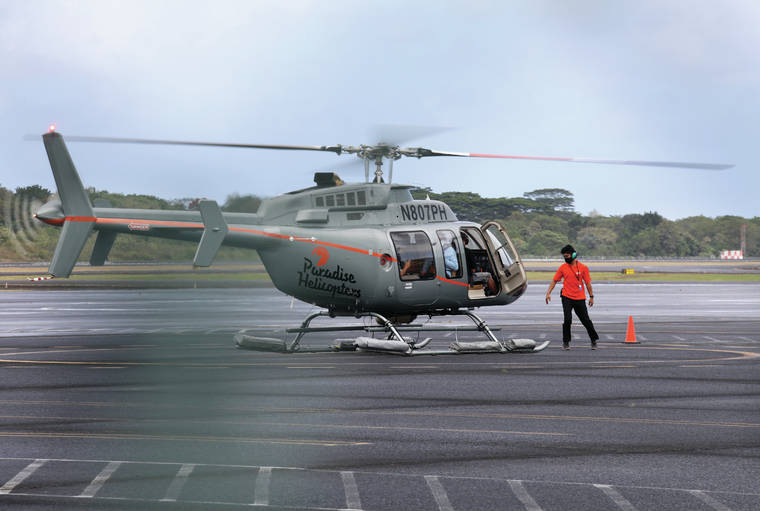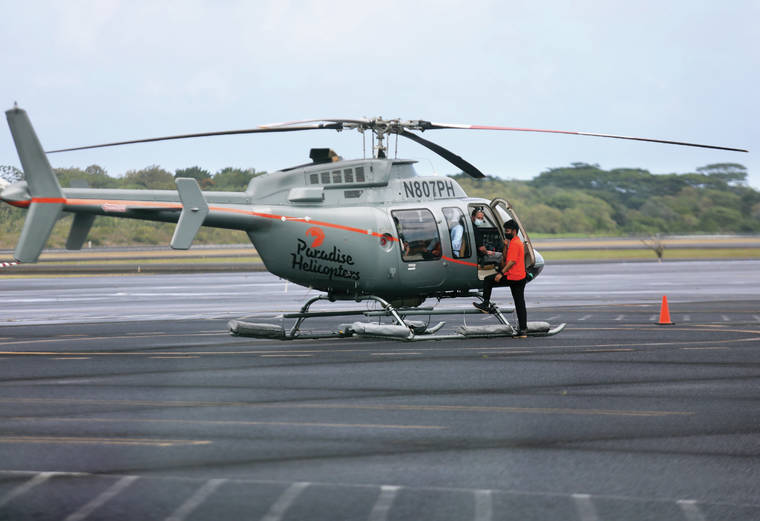Air tour noise bill shelved despite support from Case, others

A Paradise Helicopter employee helps load people into the helicopter before it takes off from the Hilo International Airport on Thursday, Feb. 11, 2021. (Kelsey Walling/Hawaii Tribune-Herald)

A Paradise Helicopter employee walks around the helicopter before it takes off from the Hilo International Airport on Thursday, Feb. 11, 2021. (Kelsey Walling/Hawaii Tribune-Herald)

A Paradise Helicopter employee talks with a pilot after helping to load people into the helicopter at the Hilo International Airport on Thursday, Feb. 11, 2021. (Kelsey Walling/Hawaii Tribune-Herald)
A bill that aims to address tour helicopter noise and safety was deferred Thursday by the state Senate Transportation Committee.
A bill that aims to address tour helicopter noise and safety was deferred Thursday by the state Senate Transportation Committee.
Senate Bill 17, if passed, would prohibit tour aircraft permit holders “from allowing the noise footprint of their tour aircraft to enter any occupied property.”
Committee Chairman Sen. Chris Lee, D-Oahu, said he appreciated the intent of the measure, but that the state attorney general “did come back with some legal issues surrounding this one. So, we will return to the issue later on, but for the moment, we’ll defer this measure.”
A second measure related to helicopters, however, was passed out of the committee with amendments, including some Lee said were “technical in nature and nonsubstantive.”
That measure, Senate Bill 1403, would require the owner or operator of commercial helicopters to maintain detailed flight records for each flight the helicopter made during the preceding month.
The legislation also calls for those records to be made available to the state Department of Transportation or the public upon request.
The bills initially were considered by the committee on Feb. 9, but decision-making was deferred until Thursday.
Noise pollution from aircraft tours has long been an issue for some Big Island residents.
Hawaii Volcanoes National Park and Haleakala National Park had, respectively, the most and fifth-most reported number of commercial air tours in the nation in 2019, according to a 2019 report from the National Park Service.
Bob Ernst, founding board member of Hawaii Island Coalition Malama Pono, or HICoP, said prior to Thursday’s committee meeting that the group, which has been fighting tour helicopter noise for years, fully supported SB 17.
Following the deferral of SB 17 on Thursday, Ernst expressed frustration and said many people across the state would be disappointed.
Lee, he said, “just sentenced the people on the ground in Hawaii to a continuation of the unbearable tour ‘copter noise nuisance pollution torture indefinitely.”
Ernst called the action “outrageous and unacceptable.”
“It’s a big let down for we, the people. It’s a big let down for good government,” he said. “I’m sure the tour ‘copter operators are happy, because it continues business as usual without oversight, without aloha and consideration of the communities they do business in.”
HICoP also supports SB 1403, but Ernst said the measure isn’t a solution, whereas SB 17 “provides a solution and also includes penalties.”
Most testimony submitted before the committee hearing supported both bills.
In written testimony, U.S. Rep. Ed Case supported both bills.
The measures “target key areas in our effort to reclaim our skies and ensure the safe and peaceful operation of air tours throughout the state consistent with the public good,” the Oahu Democrat wrote.
“COVID-19 has obscured these effects over the last year, but make no mistake that the air tour operators fully intend to resume and expand the pre-COVID status quo as soon as possible, as we already see happening with the resumption of operations,” Case continued. “That status quo saw widespread and worsening safety concerns, including in 2019 alone three fatal accidents with 21 lives lost.”
The same is true with on-the-ground community disruption, he said, with air tour operators refusing to adopt or comply with any reasonable restrictions on time, place and manner of operations to address such disruption.
“Clearly, self-regulation has not worked and will never work and, despite all attempts to pretend that they are responsive to community concerns, air tour operators will continue to make every attempt to avoid any reasonable restrictions and to dismiss public concerns,” Case said. “Only substantial regulation at all of the federal, state and local levels of government will achieve a reclamation of public skies for operations that are safe and nondisruptive.”
Case said both bills proposed reasonable regulations. He said he hoped they “would be self-adopted by the industry, but in that absence should be pursued.”
“They set forth very basic requirements that air tour operations in state airports be subjected to a basic permit with basic safety and community disruption and reporting requirements. If operators are serous about addressing safety and community disruption concerns, they should have no problem with such requirements.”
Department of Land and Natural Resources Chairwoman Suzanne Case said in written testimony that the department manages large areas of Kauai that are subject to constant overflights by tour helicopters.
Helicopter noise is a universal complaint from park visitors, she said. State parks are also being impacted by low-flying helicopter tours in locations like Diamond Head State Monument on Oahu.
“We are also aware of safety issues, including the proliferation of unauthorized drone usage in areas also frequented by helicopters,” she wrote. “In some cases, these air tours may have safety implications as well as noise implications which in turn impact the visitor experience for those at these select locations.”
State Department of Transportation Director Jade Butay said in written testimony that the department appreciates the intent of SB 17, but that the DOT Airports Division finds the term “noise footprint” ambiguous.
The state attorney general’s office asked the committee to hold both SB 17 and SB 1403, writing in regards to the former that prohibiting permit holders from allowing the noise footprint from entering any occupied property may be a regulation of the aircraft’s flight path and altitude, which are managed by the Federal Aviation Administration, and might also conflict with noise regulations.


